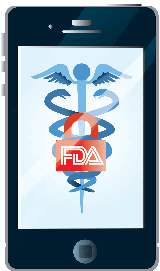 Illustration by Linas Garsys for The Washington Times
Illustration by Linas Garsys for The Washington TimesMobile technology has the potential to improve all aspects of our lives, and in many cases, it is already doing so. From getting step-by-step directions when we’re lost to playing video games when we’re bored, there are apps for every facet of life - including your health care.
Mobile medical applications are becoming increasingly popular as many Americans want to engage actively and control their own health care. Estimates indicate that the number of smartphone consumers using medical apps will grow to 500 million by 2015. This demand for mobile medical applications underscores a market-driven explosion in the use of health-information technology in ways that engage consumers, health care providers and technology vendors to enhance health care outcomes and lower health costs.
All of this innovation and growth in mobile medical applications could come to a screeching halt if the Food and Drug Administration (FDA) moves forward with its proposed regulation of mobile medical applications. The FDA continues to explore options to regulate mobile medical applications as medical devices under the Food, Drug and Cosmetic Act, particularly around adverse-event and patient-safety reporting. At this formative stage of emerging mobile medical applications, complicated and expensive new regulatory structures through the FDA would dampen prospects for future lifesaving innovations.
Patients, providers, Congress and the Obama administration have placed a high value on leveraging technology to enhance care-coordination strategies and risk-based models designed to improve health outcomes and lower costs. An emerging strategy in these models is the integrated use of mobile medical apps by clinicians and patients with electronic health records and personal health records. Such tools provide assistance to patients and others to better manage their care.
For example, a drug manufacturer makes a mobile app to remind patients when to take their medications and as a monitoring device for blood glucose levels for diabetics. A pharmacy benefit manager makes a mobile app to remind patients of prescription refills. These apps are convenient and provide valuable services to patients who seek to better manage their health. Importantly, the apps are cheap or free for consumers, and cost little to develop and distribute. A win for everyone, right?
Not if the FDA gets involved. The average time to approve a medical device is about three years and can cost upward of $75 million. In the software market, that is a lifetime. Additionally, if mobile apps are regulated as medical devices, they will be subject to the health care reform law’s 2.3 percent medical-device tax, raising prices as taxes are passed on to consumers. Free apps may no longer be free.
Constraints on speed to market and increased regulatory costs combined with tax-driven price increases may cause developers to move on to other, less burdensome endeavors.
In addition, the proposed FDA regulations overlay ongoing efforts of other federal agencies, with jurisdiction scattered across the federal and state governments. The Office of the National Coordinator for Health Information Technology and the Meaningful Use program are driving standards and financial incentives for electronic health record adoption in Medicare and Medicaid. The Centers for Medicare and Medicaid Services is implementing requirements for accountable care organizations and medical homes while providing incentives for adoption and use of cloud-based health records. States are shifting to coordinated care strategies for Medicaid and state employees. The Federal Communications Commission is pursuing broadband requirements and enforcing communications requirements related to smartphones. The Federal Trade Commission is enforcing actions against spurious medical claims made by mobile-app developers.
This piecemeal and oftentimes conflicting structure raises another concern with how the FDA’s proposed framework will coexist with the rules established by these other agencies and how these agencies will achieve the shared goals of protecting health while promoting innovation. As President Obama explained in his State of the Union speech, tearing down outdated regulatory structures to let innovation flourish and our economy grow is critical to getting back on our collective feet. The FDA proposal runs directly counter to this vision by proposing to subject mobile apps to the same regulatory approval process that was created when the floppy disk was the latest technology.
In order to stay competitive globally, especially in an all-inclusive technology market, America needs to invest in innovation. The administration should go back to the drawing board and creatively design a 21st-century regulatory framework for innovative products. We need smart regulation for health information technology, not the same old, same old. We can and must do better.
Joel White is executive director of the Health IT Now Coalition.
Sponsored Link: Do you have this “currency“ in your emergency survival kit? When disaster strikes you should have a 72-hour kit you can grab at a moment’s notice. But in addition to food and water, there’s a unique “currency“ you should have in your kit. Click here to find out what it is.
© Copyright 2012 The Washington Times, LLC. Click here for reprint permission.
By Charlotte Hays
World's most powerful man takes responsibility like a 5-year-old
Glad you liked it. Would you like to share?
Add New Comment
Showing 5 comments
Reactions